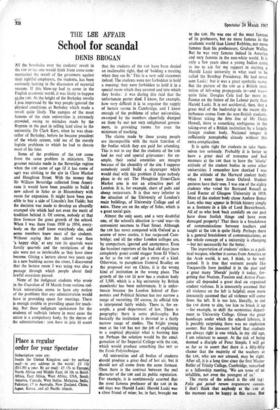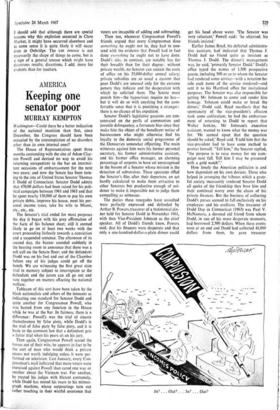School for scandal
THE LSE AFFAIR DENIS BROGAN
All the brouhaha over the students' revolt in the LSE or (as one would think from some com- mentaries) the revolt of the governors against their rightful employers, the students, has been curiously lacking in the discussion of material reasons. If this blow-up had to come in the English academic world, it was likely to happen akithe LSE. At the height of the Berkeley revolts Itwas impressed by the way people ignored the physical conditions at Berkeley which made a revolt quite likely. The campus of the most famous of the state universities is extremely crowded, owing to mistakes made by the Regents in the past in selling land close to the university. Dr Clark Kerr, when he was chan- cellor of Berkeley, before he became president of the whole system, told me of the merely logistic problems to which he had to devote most of his time.
Some of the problems of the LSE come from the same problem in miniature. The greatest mistake made in the Beveridge regime when the LsE came of age (if it has come of age) was sticking to the site in Clare Market and Houghton Street. With the money that Sir William Beveridge collected from Ameri- cans it would have been possible to build a new school in Soho or in Bloomsbury with room for expansion. It might have been pos- sible to buy a side of Lincoln's Inn Fields; but the decision was made to develop an absurdly cramped site which had not even the merit of tradition behind it. Of course, nobody at that time foresaw the great growth of the school. When I was there from 1930 to 1934, every- body on the staff knew everybody else, and some members knew most of the students. Without saying that the school was then 'a happy ship,' at any rate its quarrels were family quarrels and the restrictions of the site were not as intolerable as they have since become. Giving a lecture about two years ago in a new building across the street, I discovered that the lecture room I was using was also a passage through which people about their lawful occasions passed.
None of the indignant students who wrote in the Guardian of 18 March from various red- brick universities seems to have any notion of the problems that any administration would have in providing space for meetings. There is enough trouble in providing space for teach- ing. But these indignant spokesmen for the students of redbrick (where in most cases the union is a compulsory body, by the decree of the administration : you have to join it) assert that the students of the LSE have been denied an inalienable right, that of 'holding a meeting when they see fit.' This is a very odd statement indeed. The students were not forbidden to hold a meeting; they were forbidden to hold it in a special room which they coveted and into which they broke: it was during this raid that the unfortunate porter died. I know, for example, how very difficult it is to organise the supply of lecture rooms in Cambridge, and I know enough of the problems of other universities, swamped by the numbers cheerfully dumped on them by our not very enlightened govern- ment, in providing rooms for even the minimum of teaching.
The claims made by these young people are incompatible with the main function of the bodies which they are paid for attending. This is not to say that the students of the LSE had no real and special grievances: for ex- ample, their social amenities are meagre because of the absurdity of the site. I suppose somebody could build a skyscraper which would deal with this problem (I hope nobody plans to do so). The Houghton Street-Clare Market area is not an attractive part of London. It is, for example, short of pubs and cheap restaurants. It is thus very inferior to the situation of the University of London's main buildings, of University College and of RADA. These are on the edge of Soho, which is a great social gain.
Almost the only asset, and a very doubtful one, of the school's situation is—and was—its convenient nearness to Fleet Street. Although the LSE has never competed with Oxford as a source of news stories, it has surpassed Cam- bridge; and all the other London colleges are, by comparison, ignored and anonymous. Even the booziest reporters of the bad old days (now completely gone) could stagger from El Vino's as far as the LSE and get a story of a kind. Otherwise, to paraphrase General Bradley on the proposed war on China, it is the wrong kind of institution in the wrong place. The growth of the LSE (it now has a student body of 3,500, which is a big university by British standards) has been unfortunate. It is unfor- tunate because the London School of Eco- nomics and Political Science has too narrow a range of recruiting. Of course, its official title is interpreted fairly widely. There is, for ex- ample, a good department of law. There is geography; there is some philosophy. But basically the institution is devoted to a fairly narrow range of studies. The bright young man at the LsE has not the job of explaining to a sceptical physicist what is burning him up. Perhaps the solution would be the amal- gamation of the Imperial College with the Ise, which would produce something like MIT or the Ecole Polytechnique.
All universities and all bodies of students should produce a great deal of hot air, but it should not all come from the same furnace. Then there is the contrast between the real character of the LSE and its public reputation. For example, it is continuously asserted that the most famous professor of the LSE in its old days was Harold Laski. Harold Laski was a close friend of mine; he, in fact, brought me to the LSE. He was one of the most famous of its professors, but no more famous in the academic world than Lionel Robbins, nor more famous than his predecessor, Graham Wallas. But he was very famous indeed in America and very famous in the non-white world. It is only a few years since a young Indian came to me to ask for my support in starting a Harold Laski university in what used to be called the Bombay Presidency. He had never seen Laski : but it was a great symbolic name. But the picture of the LSE as a British insti- tution of left-wing propaganda is—and was— quite false. Douglas Cole had far more in- fluence on the future of the Labour party than Harold Laski. It is not accidental, then, that a great deal of the leadership in the recent dis- turbances comes from the non-British students. Without taking the firm line of Mr Denis Howell, there is something ambiguous in the taking-over of a British institution by a largely foreign student body. National temper is sufficiently xenophobic already without this extra complication.
It is quite right for students to take them- selves too seriously. Probably it is better to have a great deal of nonsense and bad manners at the LSE than to have the Idiotic' attitude of the student bodies in some other universities. I remember how shocked I was at the attitude of the Harvard student body when I went there from Oxford. Student gestures have their uses. I was one of the eighty students who voted for Bertrand Russell as Lord Rector of Glasgow University in 1919. Most of the student body chose Andrew Bonar Law, who may appear in British history simply as a footnote in a life of Lord Beaverbrook. All of us who look back candidly on our past have done foolish things and have even damaged property! That there is a breakdown of communications between teachers and taught at the LSE is quite likely. Perhaps there is a general breakdown of communications, as the whole concept of a university is changing —but not necessarily for the better.
The importation of students' strikes as a poli- tical weapon, whether it comes from America or the Arab world, is not, I think, to be wel- comed. It is true that eminent people like Tocqueville have justified it in the past and a great many 'liberals' justify it today, for- getting that Nazism, Fascism and Action Fran- false all depended a great deal on organised student violence. It is innocently assumed that all violence on the left is helpful; even more innocently assumed that all violence will come from the left. It is too late, literally, to cut the LSE down to size, too late to break it up —for example, to shift the economics depart- ment to University College. Given the great handicaps under which the school labours, it is possibly surprising there was no explosion sooner. But the innocent belief that students are always right is one which, in my old age, I am reluctant to accept. At the risk of being deemed a disciple of Peter Simple, I will go as far as to assert that there is a fifty-fifty chance that the majority of the teachers at the LSE, who are not amused, may be right.
After all, it is a long time since the first Master Butler of Trinity College, Cambridge, remarked at a fellowship meeting, 'We are none of us infallible, not even the youngest of us.'
The motto of the school is the old tag: Felix gui potuit return cognoscere causal.
I don't think that anybody at the Lse at the moment can be happy in this sense. But I should add that although there are special reasons why this explosion occurred in Clare Market, it might have occurred elsewhere and in some sense it is quite likely it will occur even in Oxbridge. The LSE emeute is not necessarily the shape of things to come, but is a sign of a general unease which might have disastrous results; disastrous, I add, more for students than for teachers.



































 Previous page
Previous page